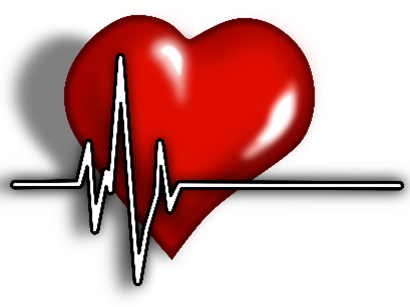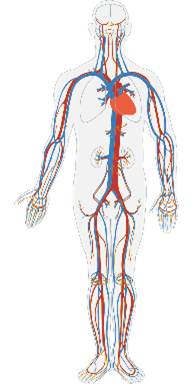Cardiovascular Health

Maintaining a healthy cardiovascular system is vital to overall wellbeing, yet cardiovascular disease remains a leading cause of preventable illness. This resource is designed to help you improve your cardiovascular health with practical strategies and ways to start thinking about optimising this for the future. By focusing on modifiable risk factors such as diet, physical activity, blood pressure, cholesterol, smoking and stress we can take meaningful steps towards prevention, and lower your risk of cardiovascular disease including heart attacks and strokes.
The sections below outline each risk factor and contain links to helpful resources with further information about each one and how to optimise these to improve your overall cardiovascular health.
Diet
A heart-healthy diet plays a crucial role in reducing the risk of cardiovascular disease. Choosing nutrient-rich foods—such as fruits, vegetables, whole grains, lean proteins, and healthy fats— and cutting down on sugary and fat-rich goods can help lower blood pressure, cholesterol, and blood sugar levels.
British Heart Foundation website – general introduction to healthy eating and food groups: https://www.bhf.org.uk/informationsupport/support/healthy-living/healthy-eating

NHS website – further discussion around Eatwell guide and how this can be used: https://www.nhs.uk/live-well/eat-well/food-guidelines-and-food-labels/the-eatwell-guide/
Exercise
Regular physical activity is one of the most effective ways to improve cardiovascular health. Exercise strengthens the heart, lowers blood pressure, improves circulation, and helps regulate cholesterol and blood sugar levels. It also supports a healthy weight and reduces stress—both key factors in heart health

British Heart Foundation – introduction to staying active and different types of exercise: https://www.bhf.org.uk/informationsupport/support/healthy-living/staying-active
NHS inform website – tips on weight loss: https://www.nhsinform.scot/healthy-living/weight-loss/
23 and a half hours video – YouTube video on exercise and how this benefits cardiovascular health: https://www.youtube.com/watch?v=aUaInS6HIGo
NHS website – exercise guidelines for different age groups, different exercise categories and links to video exercise classes to do at home: https://www.nhs.uk/live-well/exercise/
Information about local exercise opportunities and groups: https://ithriveedinburgh.org.uk/self-help/tips-and-advice-to-boost-mental-health-and-wellbeing/physical-activity/

Cholesterol
Cholesterol plays a key role in heart health, but high levels—especially LDL or "bad" cholesterol—can increase the risk of heart disease and stroke. Managing and reducing cholesterol through lifestyle changes – mainly diet and exercise as outline above - and, when needed, medication can significantly lower cardiovascular risk and support long-term heart health.
Heart UK website – multiple leaflets to help you understand cholesterol, the different types and how these can be managed: https://www.heartuk.org.uk/cholesterol/booklets
Patient website – guide to cholesterol and why high cholesterol impacts cardiovascular health: https://patient.info/heart-health/high-cholesterol
NHS website – explains what statins are and why these are sometimes useful in lowering cholesterol: https://www.nhs.uk/medicines/statins/
Blood Pressure

High blood pressure, or hypertension, is a major risk factor for heart disease, stroke, and other cardiovascular conditions. Often symptomless, it can quietly damage blood vessels over time. Monitoring and managing blood pressure through lifestyle changes and treatment can significantly reduce cardiovascular risk and promote long-term heart health.
NHS website – explains why high blood pressure can increase cardiovascular risk: https://www.nhs.uk/conditions/high-blood-pressure/
British Heart Foundation – tips on how to improve blood pressure: https://www.bhf.org.uk/informationsupport/heart-matters-magazine/research/blood-pressure/blood-pressure-tips
Diabetes
Diabetes mellitus significantly increases the risk of cardiovascular disease by damaging blood vessels and accelerating atherosclerosis. Effective management of blood glucose levels, along with healthy lifestyle choices, can greatly reduce this risk.
British Heart Foundation – explains diabetes and how this can impact cardiovascular health: https://www.bhf.org.uk/informationsupport/risk-factors/diabetes
Smoking Cessation
Smoking damages blood vessels, raises blood pressure, reduces oxygen in the blood, and accelerates the buildup of plaque in arteries—all of which significantly increase the risk of heart disease and stroke. Quitting smoking rapidly improves heart health, lowers cardiovascular risk, and enhances overall well-being. This guide offers support and strategies to help you stop smoking for good.
CDC website – explains link between smoking and cardiovascular health: https://www.cdc.gov/tobacco/about/cigarettes-and-cardiovascular-disease.html
NHS inform - how to access support to help you stop smoking in Scotland: https://www.nhsinform.scot/care-support-and-rights/nhs-services/helplines/quit-your-way-scotland/

Stress
Chronic stress can negatively affect cardiovascular health by raising blood pressure, increasing heart rate, and promoting unhealthy coping habits like poor diet or smoking. Over time, this can contribute to heart disease and other complications. Learning to manage stress through healthy strategies is essential for protecting your heart and overall well-being.

British Heart Foundation website – explores link between stress and increased cardiovascular risk: https://www.bhf.org.uk/informationsupport/risk-factors/stress
NHS website: tips on how to reduce stress: https://www.nhs.uk/mental-health/self-help/guides-tools-and-activities/tips-to-reduce-stress/
iThrive website – resources including self-help apps to help you reduce stress in your life: iThrive | Stress
Overall
Cardiovascular
Risk
The above modifiable risk factors all contribute to cardiovascular risk along with non-modifiable risk factors such as age and family history. By working to optimise the modifiable risk factors you can improve your cardiovascular and overall health. As health professionals we can use score calculators to estimate your overall cardiovascular risk which we use to make decisions about whether to start medications such as statins. You may be reading this after having this risk score calculated. If not or you would like to discuss this further then please book an appointment with a clinician.
